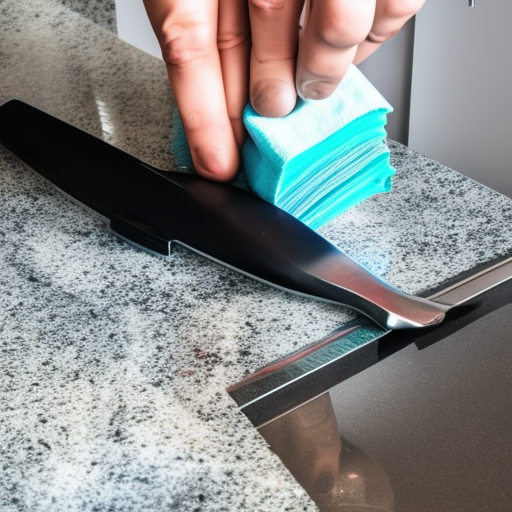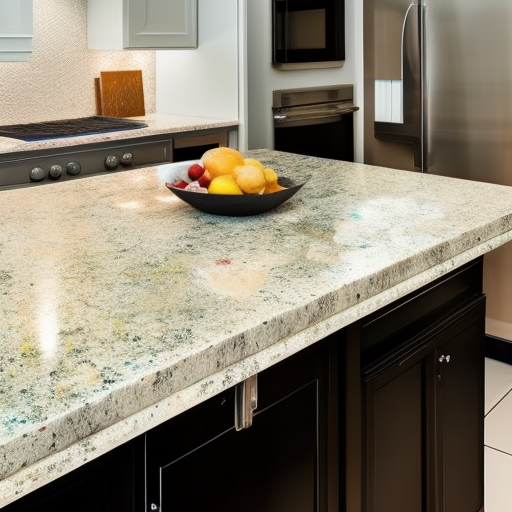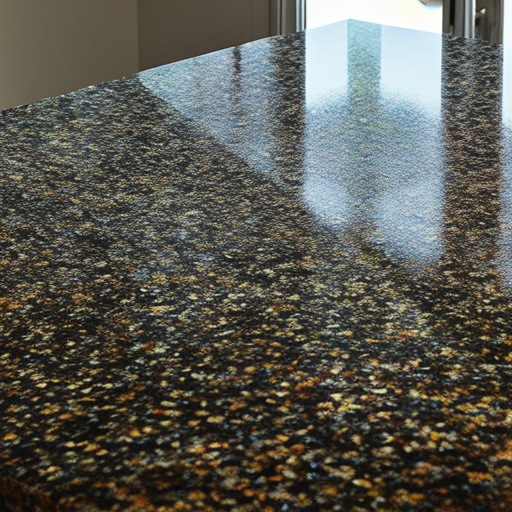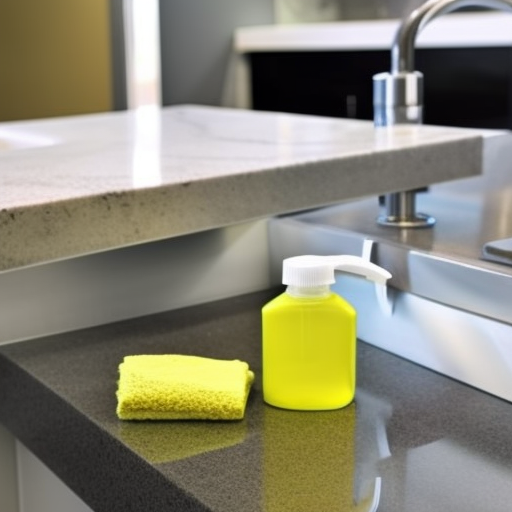Granite countertops are a popular choice for homeowners due to their durability, beauty, and longevity. However, like any other surface, they require proper care and maintenance to ensure their longevity and preserve their stunning appearance. In this article, we will provide you with essential granite care tips, a comprehensive guide to granite maintenance, expert advice on maximizing the lifespan of your countertop, and reveal some longevity secrets for maintaining stunning granite countertops. Whether you are a proud owner of a granite countertop or considering investing in one, this article will equip you with the knowledge and expertise to care for and maintain your granite countertop for years to come.
1. “Essential Granite Care Tips: Maintaining Your Countertop for Longevity”

Granite countertops are not only beautiful and luxurious but also durable and long-lasting. With proper care and maintenance, you can ensure that your granite countertop retains its beauty and functionality for years to come. Follow these essential granite care tips to maintain your countertop for longevity.
1. Clean Regularly: Regular cleaning is essential to prevent the buildup of dirt, stains, and bacteria on your granite countertop. Use a soft, non-abrasive cloth or sponge and a mild, pH-neutral cleanser to wipe the surface. Avoid harsh chemicals, abrasive scrubbers, or acidic cleaners as they can damage the granite surface and sealant.
2. Avoid Spills and Stains: Granite countertops are porous and can absorb liquids, leading to stains. Immediately clean up any spills, especially those containing acidic substances like citrus juices, vinegar, or wine. Use a blotting motion rather than wiping to prevent spreading the spill. For stubborn stains, create a paste of baking soda and water, apply it to the stained area, and let it sit for a few hours before gently scrubbing and rinsing.
3. Protect from Heat: Although granite is heat-resistant, extreme temperature changes can cause thermal shock, leading to cracks or damage. Always use trivets or hot pads under hot cookware or appliances to protect your countertop. Avoid placing hot items directly on the granite surface to prevent any potential damage.
4. Seal Regularly: Granite countertops should be sealed to enhance their stain resistance and longevity. The frequency of sealing depends on the type of granite and usage. To determine if your countertop needs sealing, perform a simple water test by dripping water on the surface. If the water beads up, the seal is intact. If it absorbs into the granite, it’s time to reseal. Follow the manufacturer’s instructions for the proper sealant and application process.
5. Avoid Scratches and Impact: Even though granite is highly durable, it is not indestructible. Avoid using sharp objects directly on the countertop surface, as they can scratch or chip the granite. Use cutting boards and place mats to protect the surface from scratches and impacts. Additionally, avoid standing or sitting on the countertop to prevent any structural damage.
6. Regular Maintenance: In addition to regular cleaning, it’s important to perform routine maintenance to keep your granite countertop in optimal condition. Wipe up spills immediately, dust the surface regularly, and use a granite-specific cleaner periodically to remove any residue or buildup. Avoid using abrasive materials or scrubbers that can scratch the surface.
By following these essential granite care tips, you can maintain the beauty and longevity of your countertop for
2. “A Comprehensive Guide to Granite Maintenance: Ensuring Long-Lasting Beauty”

Granite countertops are a popular choice for many homeowners due to their durability, beauty, and long-lasting nature. However, to ensure the longevity of your granite countertop and maintain its pristine appearance, it is essential to follow a comprehensive guide to granite maintenance.
1. Daily Cleaning Routine:
To keep your granite countertop looking its best, it is crucial to establish a regular cleaning routine. Start by wiping down the surface with a soft cloth or sponge and a mild, pH-neutral cleaner. Avoid using harsh chemicals or abrasive scrubbers as they can damage the sealant and the granite itself.
2. Sealing the Granite:
Granite countertops should be sealed upon installation and resealed every one to two years to maintain their longevity. Sealants act as a protective barrier, preventing liquids and stains from penetrating the surface. To test if your countertop needs resealing, simply pour a small amount of water onto the surface. If the water beads up, the seal is intact. If it absorbs into the granite, it’s time to reseal.
3. Immediate Spill Cleanup:
Accidents happen, and when it comes to granite, it is crucial to clean up spills promptly to avoid potential staining or damage. Wipe away any spills with a soft cloth or paper towel, gently blotting the area without rubbing. For sticky or stubborn stains, a mixture of baking soda and water can be applied as a poultice. Allow the paste to sit on the stain, covered with plastic wrap, overnight before gently rinsing it off.
4. Avoiding Harsh Substances:
Granite is a durable material, but it is still susceptible to damage from certain substances. Avoid using acidic or abrasive cleaners, such as vinegar, lemon juice, or ammonia-based products, as they can etch the surface. Additionally, refrain from placing hot pots or pans directly on the countertop, as extreme temperatures can cause thermal shock and potentially crack the granite.
5. Regular Polishing:
While granite countertops don’t require frequent polishing, occasional polishing can enhance their beauty and help maintain their longevity. Use a granite-specific polishing compound and a soft, lint-free cloth to gently buff the surface, following the manufacturer’s instructions. This process not only restores shine but also helps to seal the surface and protect it from future damage.
By following these comprehensive maintenance tips, you can ensure the long-lasting beauty and durability of your granite countertop. Regular cleaning, immediate spill cleanup, proper sealing, avoiding harsh substances, and occasional polishing are key elements of granite care that will help your countertop withstand the test of time. With proper maintenance, your granite countertop will continue to be a
3. “Maximizing the Lifespan of Your Granite Countertop: Expert Care and Maintenance”

Granite countertops are not only a beautiful addition to your kitchen or bathroom, but they are also a significant investment. To ensure the longevity of your granite countertop, it is crucial to provide expert care and maintenance. By following a few simple guidelines, you can maximize the lifespan of your granite countertop and keep it looking pristine for years to come.
1. Regular Cleaning: Proper cleaning is essential to maintain the beauty and durability of your granite countertop. Avoid using harsh chemicals or abrasive cleaners that can damage the surface. Instead, opt for a mild, pH-neutral cleaner specifically designed for granite. Gently wipe the countertop using a soft cloth or sponge, and ensure that any spills or stains are promptly cleaned to prevent them from seeping into the porous surface.
2. Sealing: Granite is a porous material, meaning it can absorb liquids and stains if left unprotected. To protect your countertop, it is necessary to apply a high-quality sealant. This sealant acts as a barrier, preventing liquids from penetrating the surface and causing damage. It is recommended to seal your granite countertop every one to three years, depending on the manufacturer’s instructions and the level of use.
3. Avoid Heat and Impact: Granite is a durable material, but it is not indestructible. To ensure the longevity of your countertop, it is essential to avoid placing hot pots, pans, or other heated items directly on the surface. Extreme heat can cause the granite to crack or discolor. Additionally, be mindful of heavy impacts or dropping heavy objects onto the countertop, as this can also cause chips or cracks.
4. Use Cutting Boards and Trivets: While granite is highly resistant to scratches, it is still advisable to use cutting boards and trivets when working in the kitchen. This precaution will help protect the surface from potential scratches or damage caused by sharp knives or hot cookware.
5. Regular Maintenance: In addition to regular cleaning, it is important to perform routine maintenance to prolong the lifespan of your granite countertop. This includes reapplying the sealant as recommended by the manufacturer, inspecting for any signs of damage or wear, and addressing any issues promptly. By staying proactive and addressing any potential problems early on, you can prevent costly repairs or replacements down the line.
By following these expert care and maintenance tips, you can ensure the longevity of your granite countertop. With proper care, your granite countertop will continue to enhance the aesthetics of your space and provide a durable and functional surface for years to come. Remember, regular cleaning, sealing, avoiding heat and impact, using cutting boards and trivets, and performing
4. “Granite Care 101: Longevity Secrets Revealed for Stunning Countertops”

Granite Care 101: Longevity Secrets Revealed for Stunning Countertops
When it comes to granite countertops, proper care and maintenance are essential to ensure their longevity and keep them looking stunning for years to come. Granite is a natural stone that is not only durable but also adds elegance and value to any kitchen or bathroom. To help you preserve the beauty and strength of your granite countertops, here are some longevity secrets revealed.
1. Regular Cleaning:
Regular cleaning is the key to maintaining the longevity of your granite countertop. To prevent stains and damage, wipe up spills immediately using a soft cloth or paper towel. Avoid using abrasive cleaners or scrub brushes, as they can scratch the surface. Instead, use a pH-neutral cleaner specifically formulated for granite countertops. Gently wipe the surface in a circular motion and rinse thoroughly with water. Dry with a soft cloth to prevent water spots.
2. Sealant Application:
Granite countertops should be sealed periodically to protect them from stains and moisture absorption. A high-quality granite sealer creates a protective barrier that repels liquids and prevents them from penetrating the surface. To determine if your countertop needs sealing, perform a simple water test. Sprinkle a few drops of water onto the surface and observe. If the water beads up, the seal is intact. If it absorbs into the stone within a few minutes, it’s time to reseal your countertop. Follow the manufacturer’s instructions for the recommended frequency of resealing.
3. Avoid Harsh Chemicals:
To maintain the longevity of your granite countertop, it’s crucial to avoid using harsh chemicals or acidic cleaners. Substances like vinegar, lemon juice, ammonia, or bleach can etch the surface and cause discoloration. Instead, opt for mild, pH-neutral cleaners specifically designed for granite. Always read the labels of cleaning products to ensure they are safe for use on granite surfaces.
4. Protect from Heat and Scratches:
While granite is highly heat-resistant, it is still advisable to use trivets or hot pads to protect the surface from hot pots, pans, or appliances. Placing a hot item directly on the countertop can cause thermal shock and potentially damage the stone. Additionally, use cutting boards and avoid chopping or slicing directly on the granite surface to prevent scratches. Although granite is durable, it is not scratch-proof.
By following these granite care and maintenance tips, you can ensure the longevity of your countertops and keep them looking stunning for years to come. Regular cleaning, proper sealing, avoiding harsh chemicals, and protecting from heat and scratches are all essential practices for maintaining the beauty and functionality of your granite countertop. With




